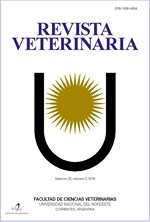Biochemical and morphometrical parameters associated with dentition in water buffaloes. Relation with the number of incisors
DOI:
https://doi.org/10.30972/vet.3024132Keywords:
Buffalo, dental timing, blood biochemistry, morphometryAbstract
The classification of the productive stages and health of an animal or the herd can be established by changes in the incisor teeth and the determination of hematological values. The aim of this work was to evaluate the effect of changes in the number of permanent incisors on morphometric and blood parameters related to bone metabolism in 32-month-old animals. The assay was performed in Corrientes, Argentina, where 30 Murrah females of 29-monthsold with complete deciduous teeth were weighed and maintained for 90 days on natural pastures. At the end of the assay, the number of erupted permanent incisors and the amount and level of eruption of the dental pieces, were evaluated. Weight (PV), thoracic perimeter (PT) and body condition (CC) were recorded. Blood samples were taken to determine the values of calcium, phosphorus, magnesium and alkaline phosphatase. The information was analyzed with descriptive statistics, analysis of variance and correlation using the Pearson’s test. The 37% of the animals showed two teeth, 16% one (right or left) and 47% did not have permanent incisors. The values of PV (kg) and PT (cm) for individuals with deciduous incisors, with one or pair permanent incisors, were 425.36 ± 16.13; 456 ± 17.67; and 426.64 ± 12.91 (p = 0.462) and 190 ± 7.66; 197.20 ± 4.76; and 189.91 ± 8.9 (p=0.187) respectively, without statistical significance. Magnesemia was significantly higher in animals without incisors and with one tooth, compared to those with two erupted teeth (r= -0.45 p<0.05). None of the other biochemical variables were influenced by the number of teeth (p≥0.05). The body condition, as well as the morphometric and blood parameters, were not affected by changes in the dental timing, with the exception of serum magnesium.
Downloads
Downloads
Published
How to Cite
Issue
Section
License
Revista Veterinaria (Rev. Vet.) maintains a commitment to the policies of Open Access to scientific information, as it considers that both scientific publications as well as research investigations funded by public resources should circulate freely without restrictions. Revista Veterinaria (Rev. Vet.) ratifies the Open Access model in which scientific publications are made freely available at no cost online.










.jpg)
.jpg)



